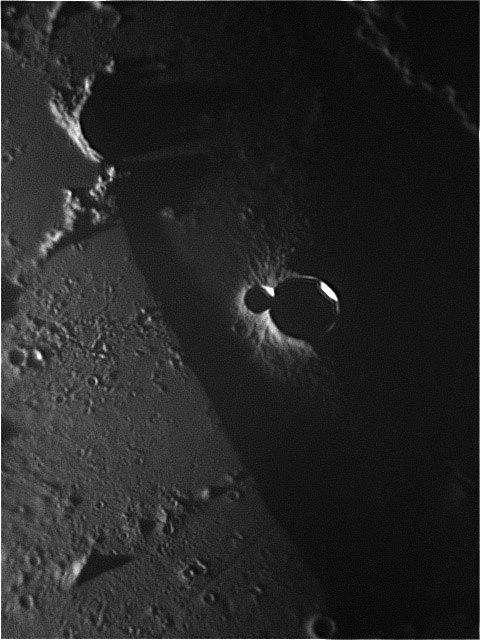Difference between revisions of "March 7, 2009"
| Line 3: | Line 3: | ||
<!-- ws:start:WikiTextHeadingRule:2:<h1> --> | <!-- ws:start:WikiTextHeadingRule:2:<h1> --> | ||
<!-- ws:start:WikiTextLocalImageRule:8:<img src="/file/view/LPOD-Mar7-09.jpg/61296246/LPOD-Mar7-09.jpg" alt="" title="" /> -->[[File:LPOD-Mar7-09.jpg|LPOD-Mar7-09.jpg]]<!-- ws:end:WikiTextLocalImageRule:8 --><br /> | <!-- ws:start:WikiTextLocalImageRule:8:<img src="/file/view/LPOD-Mar7-09.jpg/61296246/LPOD-Mar7-09.jpg" alt="" title="" /> -->[[File:LPOD-Mar7-09.jpg|LPOD-Mar7-09.jpg]]<!-- ws:end:WikiTextLocalImageRule:8 --><br /> | ||
| − | <em>south up image by [mailto:as.kidd@tiscali.co.uk | + | <em>south up image by [mailto:as.kidd@tiscali.co.uk Simon Kidd], Welwyn, Hertfordshire, UK</em><br /> |
<br /> | <br /> | ||
A joy of LPOD is receiving startling new images that show features as I've not seen them before. This is one of the best examples, depicting a familiar scene in a very different light. The diagonal slash of shadow is, of course, the Straight Wall just at sunrise. The low angle of illumination creates a broad swath of darkness extending off toward the west (to the right in this south up view). Sticking up into the early morning glow are the rims of Birt and Birt A. Simon wrote that for about 30 minutes they appeared as illuminated rings, like a giant beetle, in pre-dawn darkness. On my laptop I can recreate that view by pushing the monitor back, decreasing the brightness. This image has other treasures. It clearly confirms that the linear feature extending from bottom left to the Straight Wall is a rille, not just a lineament. Why is it so faint? Is it an older rille, thinly covered by lava? A final delight here is the dramatic light gap at the top of the Wall. These hills used to be called the Stag's Horn Mountains, and they have also been compared to the handle of a sword - the blade being the slightly curved scimitar of the Straight Wall. Wonderful picture!<br /> | A joy of LPOD is receiving startling new images that show features as I've not seen them before. This is one of the best examples, depicting a familiar scene in a very different light. The diagonal slash of shadow is, of course, the Straight Wall just at sunrise. The low angle of illumination creates a broad swath of darkness extending off toward the west (to the right in this south up view). Sticking up into the early morning glow are the rims of Birt and Birt A. Simon wrote that for about 30 minutes they appeared as illuminated rings, like a giant beetle, in pre-dawn darkness. On my laptop I can recreate that view by pushing the monitor back, decreasing the brightness. This image has other treasures. It clearly confirms that the linear feature extending from bottom left to the Straight Wall is a rille, not just a lineament. Why is it so faint? Is it an older rille, thinly covered by lava? A final delight here is the dramatic light gap at the top of the Wall. These hills used to be called the Stag's Horn Mountains, and they have also been compared to the handle of a sword - the blade being the slightly curved scimitar of the Straight Wall. Wonderful picture!<br /> | ||
<br /> | <br /> | ||
| − | <em>[mailto:tychocrater@yahoo.com | + | <em>[mailto:tychocrater@yahoo.com Chuck Wood]</em><br /> |
<br /> | <br /> | ||
<strong>Technical Details</strong><br /> | <strong>Technical Details</strong><br /> | ||
| Line 14: | Line 14: | ||
<strong>Related Links</strong><br /> | <strong>Related Links</strong><br /> | ||
Rükl plate [http://the-moon.wikispaces.com/Rukl+54 54]<br /> | Rükl plate [http://the-moon.wikispaces.com/Rukl+54 54]<br /> | ||
| − | An earlier [http://www.lpod.org/?m=20070408 | + | An earlier [http://www.lpod.org/?m=20070408 view], not quite so dramatic, perhaps because the Wall does not cut diagonally across the image.<br /> |
<br /> | <br /> | ||
<hr /> | <hr /> | ||
Revision as of 17:10, 11 January 2015
The Beetle

south up image by Simon Kidd, Welwyn, Hertfordshire, UK
A joy of LPOD is receiving startling new images that show features as I've not seen them before. This is one of the best examples, depicting a familiar scene in a very different light. The diagonal slash of shadow is, of course, the Straight Wall just at sunrise. The low angle of illumination creates a broad swath of darkness extending off toward the west (to the right in this south up view). Sticking up into the early morning glow are the rims of Birt and Birt A. Simon wrote that for about 30 minutes they appeared as illuminated rings, like a giant beetle, in pre-dawn darkness. On my laptop I can recreate that view by pushing the monitor back, decreasing the brightness. This image has other treasures. It clearly confirms that the linear feature extending from bottom left to the Straight Wall is a rille, not just a lineament. Why is it so faint? Is it an older rille, thinly covered by lava? A final delight here is the dramatic light gap at the top of the Wall. These hills used to be called the Stag's Horn Mountains, and they have also been compared to the handle of a sword - the blade being the slightly curved scimitar of the Straight Wall. Wonderful picture!
Chuck Wood
Technical Details
4th Mar 2009, 2100UT. Celestron C14, Skynyx 2 camera, 1100 frames from 3200. Seeing conditions very average.
Related Links
Rükl plate 54
An earlier view, not quite so dramatic, perhaps because the Wall does not cut diagonally across the image.



